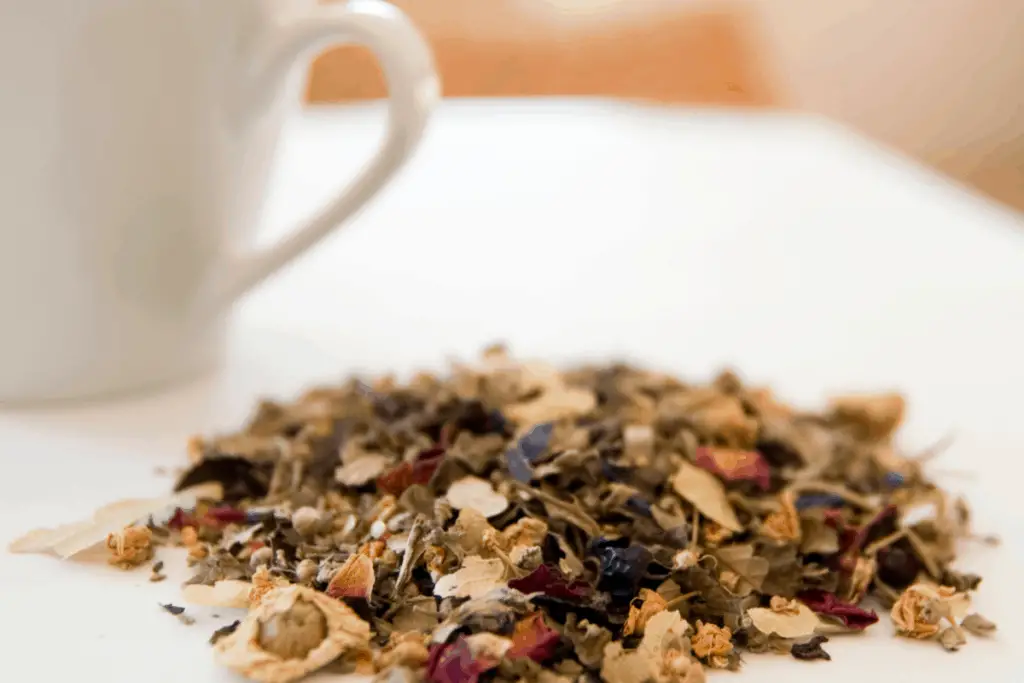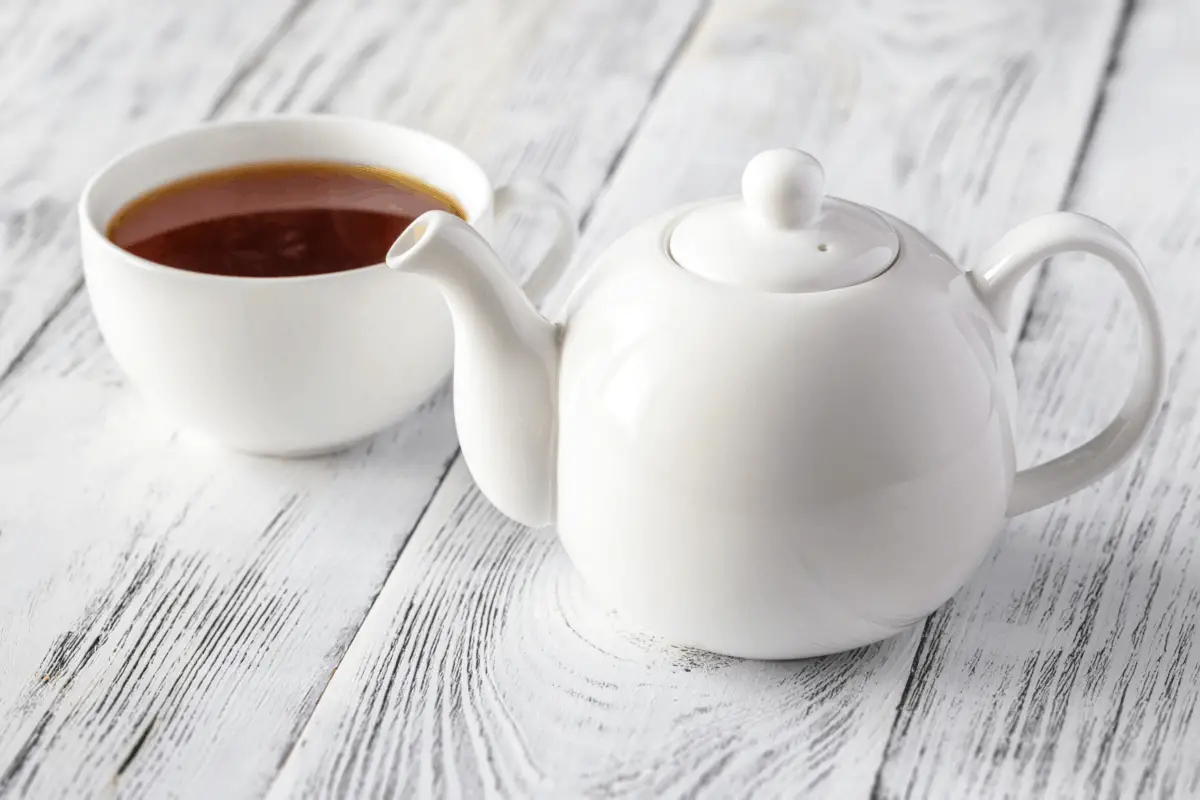Whether you are new to tea or have enjoyed it for decades, you are probably always trying to finetune your tea preparation methods. And even if you have perfected your tea routine, purchasing a new kettle or using a different stove can require some adjustments. Tender teas, such as white tea or green tea, are extra sensitive to water temperature. While black tea is a global standard, and can withstand the highest temperatures of all teas, you might find yourself using water that is actually too hot. Is it really possible to burn black tea?
It is possible to burn black tea leaves. This can cause an extremely bitter and burnt taste. Black tea should be steeped for around 3-5 minutes at a temperature 212° F or lower. However, black tea leaves are by far the easiest tea to brew and the least likely to burn versus other teas.
High water temperature affects teas in various ways.
When the temperature of your water reaches 176° F (80°C), the heat releases the tannins from the tea leaves, developing a very bitter taste.
Amino acids are released from tea leaves at 140° F (60 °C).
In addition, when the water is too hot the caffeine in the tea leaves will be released all at once.
With all of this in mind, let’s cover a few more specifics of whether or not you can burn black tea, whether you can burn other types of tea, and additional information about tea temperature, the surprising health benefits of over-boiled tea, and uses for over-boiled tea and leaves.
“The higher temperatures serve to extract the deeper, complex flavors of black tea.”
TEA CROSSING
Can You Over Boil Black Tea?
You can over boil black tea. As I mentioned above, black tea should be steeped between 3-5 minutes at a temperature not reaching more than 212 degrees Farenheit. Black tea leaves are already oxidized during harvesting and processing, making them not as likely to burn.
Many people believe black tea should not be boiled at all. When black tea is brought to a boil or boiling water is poured over tea, it can scald the tea leaves instantly, making them release less flavor than you might like and leaving a bitter taste or bite to the tea.
It is best to remove your water right before it starts to boil and let it sit for a minute or two. Then steep your tea for the recommended time, which is between three to five minutes.
After the time is up, remove your tea leaves and discard them or reuse them. Read more about the effective ways to resue your black tea leaves later in this article.
Can You Over Boil Every Type of Tea?
Any tea can be over boiled or over-brewed. Boiling tea, in general, is harsh on the leaves and can scorch them. It is generally best to stop the water before it boils, or bring the water to a boil and then let it cool down.
Green tea, for example, is extremely easy to over boil because it is a very delicate leaf. It even has a strict steep time limit to brew at under three minutes. When you over brew green leaf tea, it will become very bitter.
However, if you do over brew your green tea, healthy compounds like L-theanine concentrates at higher levels and makes your cup, though bitter, even healthier. Of course, you have to be able to tolerate that strong, bitter flavor.
Some people enjoy a strong tasting tea as long as the heat level isn’t too high. Leaving the tea to brew for a longer time should not make it taste bitter. Instead, the tea will just pack a big punch.
Are There Health Benefits to Over Boiling Tea?
There may be health benefits to over boiling or brewing tea. The release of tannins, caffeine, and additional compounds such as L-theanine, while potentially bitter, combine to create a healthy tonic. Specifically, L-theanine is known to help with anxiety, and the addition of caffeine can offer a relaxed focus.
While over boiling black tea, and all teas for that matter, can release an abundance of tannins and caffeine, you might actually want to consider it.
Carolyn M. Matthews, MD, has studied the health benefits of tea and states that:
“If the tea leaves are left in the hot water too long, they start releasing tannins, which impart a bitter taste to the tea (interestingly, steeping green or black tea for a longer period of time, such as 15 minutes, gives a bitter drink that can be used as a home remedy for diarrhea).”
Carolyn M. Matthews, MD
Black tea is great for your skin, full of antioxidants, has anti-inflammatory properties, and can help you to relax before bed.
Black tea can even help kill bacteria in your mouth, preventing bad breath and mouth infections. Research has even shown that black tea can be used to reduce and reverse the signs of oral cancer.
How Long to Steep Tea: Basic Guidelines
The general steeping time guidelines vary for each type of tea, and they will probably also vary depending on who you ask. White, Green, Oolong, and Pu-erh teas should be steeped for less time and at lower temperatures. Black tea can steep the longest and at the highest temperatures.
The tea steeping time and temperature chart below will be a good guide.
Tea Steeping Time and Temperature Chart
Each tea has its preferred water temperature with white needing the coolest and black tolerating the hottest.

Refer to this chart when you need basic guidance:
| Tea | Steeping Time | Water Temperature |
| White | 2-6 min. | 158 – 167°F |
| Green | 2-4 min. | 167 – 176°F |
| Oolong (Wulong) | 1 min. | 185 – 206°F |
| Pu-erh (Pu’er) | ½ – 1 min. | 195 – 212°F |
| Black | 3-5 min. | 195 – 212°F |
If you want to take the guesswork out of the time and temperature, you can use a timer along with a variable temperature kettle.
If you don’t have a variable temperature kettle, the next best option is to use a cooking thermometer to determine when the water has cooled down sufficiently for your white, green, or oolong tea.
You may also want to read my article The Ultimate Guide to Tea Brewing Temperatures and Times for additional tips and details.
I have found (and please keep in mind) that recommendations vary sometimes as much as 30 degrees, even for the same type of tea.
The best guide will be the basics above combined with your own experience and preference. Sometimes brewing tea is as much of an art as it is a science. You may even want to record the times and temperatures at which you get the best experience for each of your teas.
Why Do Black Leaves Tolerate Higher Temperatures?
Black tea is fully fermented (meaning, oxidized) by allowing it to be exposed to the sun and to wither. This creates a tea that is also best for steeping at higher temperatures. In fact, the higher temperatures serve to extract the deeper, complex flavors of black tea.
Most of the common teas you drink all come from the same plant species. The difference is how they are processed after they are harvested.
Black, Green, White, and Oolong tea leaves all come from the Camellia Sinensis plant, which is mainly found and grown in China, Japan, India, and Thailand.
The way the plant is harvested has an extreme impact on the end result.
The best tea gardens are found in cooler climates. Following harvest, the leaves are left to wither and dry out. Once dry, they then begin to ferment. This step is very important and allows oils of the leaves to be produced.
When the fermentation process is finished, the leaves are sorted by size. Typically, teas are made up of different sizes of leaves and tea dust.
Black tea leaves usually are allowed to wither and ferment. This results in a more highly oxidized tea and creates many of the health benefits you’ve become fond of with black tea.
In contrast, green tea leaves are steamed and parched immediately after picking them. Similar to the process for harvesting and processing white and oolong teas, this stops the oxidation process and results in a slightly different taste and benefit profile.
These seemingly small steps create very different types of teas.
Can You Make Your Own Black Tea Leaf Blends?
You can make your tea blends with tea, herbal tea, spices, dried fruits, seeds, and anything else that can be steeped. To make a new custom blend, start with a base tea that will make up over half of your tea blend. This can be your favorite black tea.
The other ingredients will consist of many different things. From cloves to ginger, vanilla beans to coconut flakes, and dried cranberries to rose petals. The list of ingredients you can use to create a custom tea blend is just about endless.

You can find a great article with a few tea blend recipes to try at Cooking with Books.
When it comes to whether or not a custom blend can be burnt or over-steeped, I would recommend referring to the chart above and begin experimenting.
How Can You Reuse Over-Boiled Black Tea Leaves?
You can reuse burnt or over-boiled black tea or tea leaves in a number of ways. You can create baths, facial treatments, cleansers, and amendments for your garden. If you’ve ended up with a bitter black tea due to over-boiling, you can still use the tea and leaves in effective ways.

Here are a few things you could consider doing with your bitter, over-boiled black tea and leaves:
- Shine a Wood Floor – Black tea contains tannins; those tannins help to give the shine back to your hardware floor. Simply rub brewed tea on the floor.
- Use as a Furniture Polish – Brewed tea can also shine your wood furniture.
- Clean Mirrors and Windows – Tea can remove fingerprints. Fill a spray bottle with brewed tea and get to work.
- Soothe a Sunburn – Wet and cool teabags can soothe minor burns and sunburn.
- Improve Skin Quality – Black and green tea is exceptionally good for the skin and reduces acne. Green or black tea baths or washing your face with green tea are both effective.
- Use as a Garden Fertilizer – Instead of tossing your old tea bags into the trash, add tea bags to your plants that thrive in rich, acidic soil.
- Heal a Broken Nail – The tea bag itself can be glued to a broken or chipped nail to allow it to heal without getting caught on things throughout the day.
All around the world, tea is the most common drink, second only to water. Whether it’s a hot cup of tea or a glass of sweet iced tea…it’s often made with black tea.
There are many options for making (or re-using) the perfect cup of black tea, even if it is burnt or over-boiled.
Remember to be cautious of the temperature and keep track of your time, and you’ll be enjoying your black tea for decades to come.

